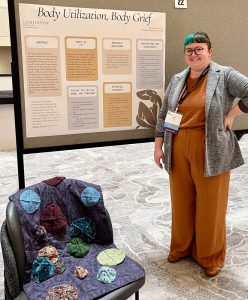 In Leah Dudak’s experience, the job of a public librarian is more traumatic and intense than most people would think, especially with the recent waves of book banning and censorship across the country. While she felt prepared for the emotional load, not all of her colleagues did, so she decided to research trauma in libraries.
In Leah Dudak’s experience, the job of a public librarian is more traumatic and intense than most people would think, especially with the recent waves of book banning and censorship across the country. While she felt prepared for the emotional load, not all of her colleagues did, so she decided to research trauma in libraries.
Now a third year Ph.D. student studying information science and technology at Syracuse University’s School of Information Studies, Dudak is combining her trauma research with her love of quilting, crocheting and embroidering to tell the stories of librarians’ struggles.
“I started researching trauma in libraries originally to give myself language to describe my and my colleagues’ experiences,” she said. “But when COVID-19 hit and things ramped up in terms of trauma, I decided that this was an area I could spend a lifetime researching and that I had things I wanted to say around it. I use art in my research as a way of collecting and sharing data.”
Dudak is currently examining library bodies at work – or more specifically, how librarians feel in their bodies while at work.
“I reflected on how I saw my body when I worked in libraries, and I realized I felt a loss of identity to the library, and realized people who came into the library did not see me as Leah who worked at the library, but I was the library and not fully human,” she said. “As such, I created a crochet and quilt shawl where I tried to mimic this loss of identity/self. So, while I lost myself to my work, this piece encourages people to pick it up and wear it, and through wearing it lose themselves to the art piece.”
Using the quilting and crocheting skills her grandmothers taught her, Dudak hopes to allow other librarians to share their personal experiences with trauma. In the next step of her research, she plans to ask library workers to spend up to 15 minutes drawing how they see or think of their bodies at work. Following that, she will ask them to write a reflection, and she will interview them to talk about their reflection and drawing.
“I hope to also embroider some of these images onto my shawl, interlacing our stories,” Dudak said. “I hope that this research will provide a baseline of the library worker’s body at work that I can then build my dissertation from this.”
“This work is important to me not only because it is something I am curious in, but also in using sewing and crochet, I am also validating and uplifting typical female ways of knowing and challenging academia to imagine what academic output can look like outside of the typical research paper format,” she added.
In 2022, Dudak was part of a study with Urban Librarians Unite, which highlighted trauma in libraries. She is now working on ways to cope with that trauma, as well as looking at systems that allow it to occur. After graduation, planned for 2026, Dudak hopes to get a tenure track position at a research institution so she can continue researching trauma and library work.
“I hope that my work will help give language to and create change in library work to make it healthier for workers. I also hope that in my teaching I will be able to better prepare librarians for the realities of library work,” she said.
Dudak decided to apply to Syracuse after the school showed interest in her work. Since enrolling, she has felt incredible support from the faculty.
“I think the school has prepared me for my future by encouraging us to do research and try things even if we don’t succeed,” she said. “So much of the Ph.D. is trying things and getting feedback. I know that I have great faculty in my corner here who not only support me but challenge me to be the best scholar I can be.”
